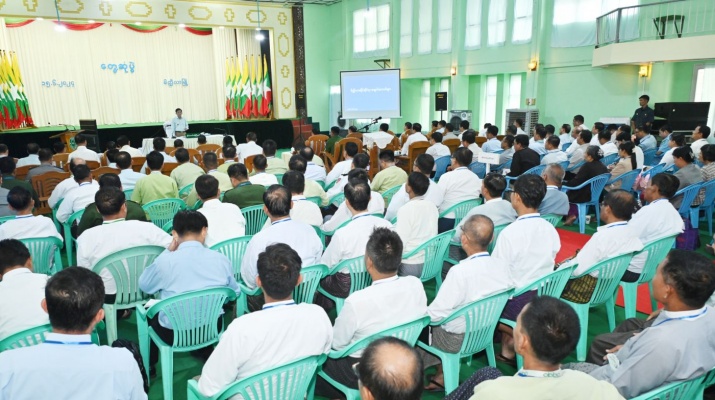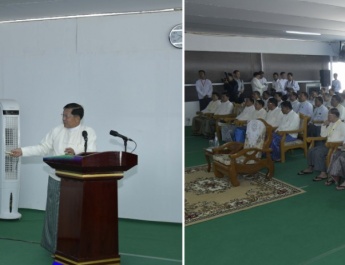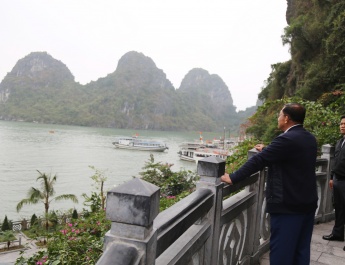Nay Pyi Taw June 15
Chairman of the State Administration Council Prime Minister Senior General Min Aung Hlaing met with district and township level departmental officials and elders in Meiktila district in Mandalay Region at the Kandaw Mingalar Hall in Meiktila this morning and regional development tasks.
Also present at the meeting together with the Senior General were Joint Secretary Lt-Gen Ye Win Oo and member Lt-Gen Nyo Saw of the SAC, union ministers U Min Naung, U Hla Moe, U Khin Maung Yi and Dr Charlie Than, Mandalay Region Chief Minister U Myo Aung, Magway Region Chief Minister U Tint Lwin, Sagaing Region Chief Minister U Myat Kyaw, senior officers from the Office of the Commander-in-Chief of Defence Services, the commander of the central command, Meiktila district and township level departmental officials and elders.

Salient points about respective regions reported
First, Chairman of Meiktila District Administration Council District Administrator U Zaw Zaw Oo reported to the Senior General on salient points of the district, development tasks of the district including social, economic, education, health and pleasantness. Then, the Mandalay Region chief Minister reported to the Senior General on assistance offered by the regional government for development tasks of the districts.
Then, departmental officials and elders reported to the Senior General on the needs for facilitation of trade flow as the town is stable and prosperous and trading hub, upgrading roads to ease traffic congestion, construction of a hall for students’ festival, construction of a ring road on Meiktila-Kyaukpadaung Road, meeting the targeted yields for cotton, requirements for cotton farmers to meet the cotton and textile domestically, the requirements for quality cotton strains and regional development tasks.
Officials respond to reports for respective sector
In connection with the reports union ministers explained measure being taken to carry out research on quality cotton species at home, availability of quality paddy strains and inputs at reasonable prices in the district, the need to contact to officials as water supply for agriculture has been made available by relevant ministries and to cultivate crops properly as the government has been offering assistance, coordination of relevant ministries for sustainable development of cotton cultivation and the textile industry by organizing workshops to fulfil the needs for inputs, techniques and equipment, the needs for farmers to make efforts to meet the cotton demand at home to enable the cotton and textile industry at its full capacity.
After hearing the reports, the Senior General said the government has been upgrading roads as much as possible and road users are required to abide by road and traffic rules strictly for the durability of roads. If officials who are responsible for enforcement of disciplines are required to perform duties responsibly, traffic congestions will be eased and the number of accidents will be reduced due to abidance of rules. The construction of the student festival hall will be reviewed. The government has been taking measures to build wide school buildings and compounds in accordance with requirements to enable students to learn peacefully.
Relevant entrepreneurs are required to make efforts for availability of quality cotton strains as the market economy and private economic systems are being implemented. While the State will provide support to the best of its ability, it is essential for cotton farmers to primarily strive to cultivate quality and pure varieties. Similarly, to achieve the cultivation of high-quality rice, it is necessary to collaborate with relevant ministries and organizations to obtain varieties suitable for their regions.
Meiktila District is a region with central importance and unique characteristics
During a discussion on the development of Meiktila District, the Senior General stated that Meiktila District, located at the crossroads of Myanmar, is a significant area with strategic importance. It is centrally located in the country, making it a pivotal city for trade. In terms of education, the district is home to numerous universities and colleges. The district’s favorable geographical conditions facilitate smooth operations, making it a convenient area for various activities. Based on the regional data of Meiktila District, systematic studies and calculations were conducted to develop the region’s socio-economic aspects.
The findings would be presented through a PowerPoint presentation, emphasizing the optimal use of the district’s foundational resources for development.
Officials are encouraged to consider these factors and implement necessary measures.
Strive for the success of businesses based on agriculture and livestock breeding
Meiktila District predominantly engages in agriculturalbased economic activities. The district cultivates rice, groundnuts, sesame, sunflowers, green grams, pigeon peas, and cotton.
However, the output targets are not yet fully met. For agriculture, proper varieties, soil preparation, adequate fertilization, sufficient water supply, and correct cultivation methods are required. Reports indicate that due to poor soil quality, the district’s yield rates are low.
Enhancing soil quality through appropriate fertilization and soil improvement methods is necessary to increase yields.
The calculations show significant revenue losses due to the shortfall in production targets.
Specifically, for rice cultivation, with a total area of 123,542 acres, the shortfall in yield results in a loss of 3,626,892 units as per acre yield declined by 31.74 units, amounting to Ks-79,791.62 million in losses. For groundnuts, with 52,684 acres, the loss is 1,875,807 units, amounting to Ks-46,895.18 million in losses.
For sesame, with 333,659 acres, the loss is 5,168,647 units, amounting to Ks-568,551.17 million in losses. Similarly, shortfalls in the production of other crops like sunflowers, green grams, pigeon peas, and cotton have also led to significant financial losses for the district. Achieving target yields would contribute to the socio-economic development of the district, as indicated by the practical assessments.
Therefore, it is necessary to strive for achieving the target outcomes. The district and township administrators should lead the efforts to develop agriculture and livestock breeding industries in the Meiktila District, as well as to improve social affairs, education, health, and maintain discipline. Issues that cannot be resolved at the district and township levels should be progressively reported and addressed at higher levels. Coordination and resolution efforts will be carried out at the national level and through the relevant ministries.
Regarding oil crops, Meiktila District cultivates groundnuts, sesame, and sunflowers. Cultivating substitutes like soybean and sunflower could increase domestic oil production, leading to economic growth. Cotton, as an industrial crop, requires special attention and proper cultivation methods. Since clothing is essential from birth to death, cotton cultivation is crucial. For domestic production of A-Grade cotton, it is necessary to obtain quality varieties and ensure proper cultivation techniques. Meiktila District, being a region with notable cotton production, should also strive to develop related industries.
Producing high-quality cotton fabrics domestically would reduce the need for imports and potentially enable exports, meeting domestic demand.
Therefore, advancing cotton cultivation and production will lead to the socio-economic development of the region.
It was found that onions are grown in Meiktila District, and if they can produce good yields, they will be sold to local and foreign markets. They will also be able to produce and sell highvalue onion-based products. If onions can be grown and sold throughout the year, the local economy will develop, and by exporting and selling them abroad, it will help the country’s economic development a lot.
Regarding rice cultivation, the locals must try to improve the yield and meet the food needs of the region. By bringing in the local food needs, the expenses will go to the outside of the region and will affect the economic development of the region. Therefore, efforts should be made to ensure rice selfsufficiency in Meiktila District.
Regarding livestock, chicken, pork, goat, cow and fish is the main meat consumed daily, and in Meiktila District, chicken, pork, goat and cows were being raised successfully. Meiktila is a market town because it is a place where roads cross and many travellers come and go every day. The local consumption has been self-sufficient and the surplus has been transported to domestic and foreign countries.
In addition to frozen meat and fish, milk and dairy products from the dairy cattle breeding industry will also be successfully developed and exported. As our country has to import milk and dairy products from abroad every year, we need to make efforts to make dairy cattle farming in Meiktila District successful and productive.
Layers chickens, broilers, local chickens, dairy cows, beef cattle, buffaloes and goats were raising in Meiktila District. If the waste products produced from agriculture are used as animal feed and are properly raised, the livestock industry will also improve a lot.
In order to carry out the successful development of such agricultural and livestock activities, we need to be able to produce human resources. In Meiktila district, there were 19,045 students attended kindergarten in the 2011-2012 academic year, 16,669 students at the primary schools with 12.48 percent less, 14,981 students at the middle schools with 21.34 percent less, 5,840 students at the high schools (Grade-10) with 69.34 percent less and 4,921 students at the high schools (Grade – 12) with a decrease of 74.16 percent. So it was found that there were a lot of changes in grades. Therefore, we need to work together to ensure that the children have a high level of education. As all universities, colleges and basic education schools in Meiktila District are fully equipped, we have a good condition in terms of education where they can learn without leaving their home town.
If we encourage education, we will be able to produce educated people who are needed for farming and the socio-economic life of the region will be able to develop a lot.
Regarding getting enough water for agriculture, there are dams and streams already existed in Meiktila area, and if the forests are preserved as the Myanmar saying goes, “Weather depends on forests”, it will lead to the greening of the area and the successful implementing of the agriculture sector. There are few forests in the catchment areas of dams in Meiktila area.
Therefore, if watershed forests are to be planted, we will be able to continuously obtain and conserve water. Similarly, in order to obtain enough water for agriculture, we need to carry out solar energy-powered river irrigation projects.
In order to obtain natural water supply, there are rain water, underground water and streams and there is a need to find ways to obtain water suitable for Meiktila area.
If it is possible to get enough water, agriculture and farming will improve.
Meiktila area is a focal point of Myanmar and has good infrastructure that facilitates easy transportation. Similarly, regarding education, there are already many schools, so there are good educational foundations.

Therefore, for the development of the Meiktila area, it is necessary to take advantage of the good foundations. If the people in the area will make efforts to improve, the Meiktila area will improve.
The state is also supporting as much as possible. For the development of an area, the efforts of the local people who live in the area are the main thing. We are working to collect the population and census in October, and are preparing to hold a free and fair multi-party democratic general election next year. If we don’t carry out the work we have to do because of politics, our progress will be delayed. Therefore, the people of Meiktila area to take advantage of the good foundations they already have and carry out the development of the area in an all-round way.
After that, the SAC chairman, the Prime Minister warmly greeted those who attended the ceremony.
After that, it is reported that the SAC chairman and members toured Meiktila University and Meiktila University of Economics in their vehicles.





